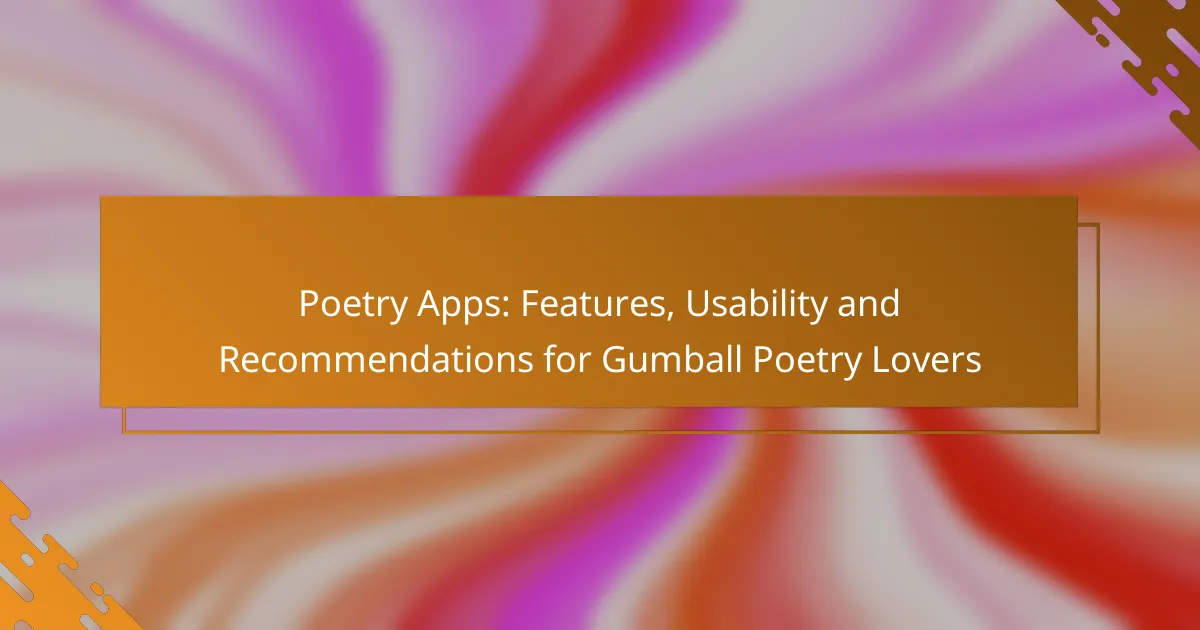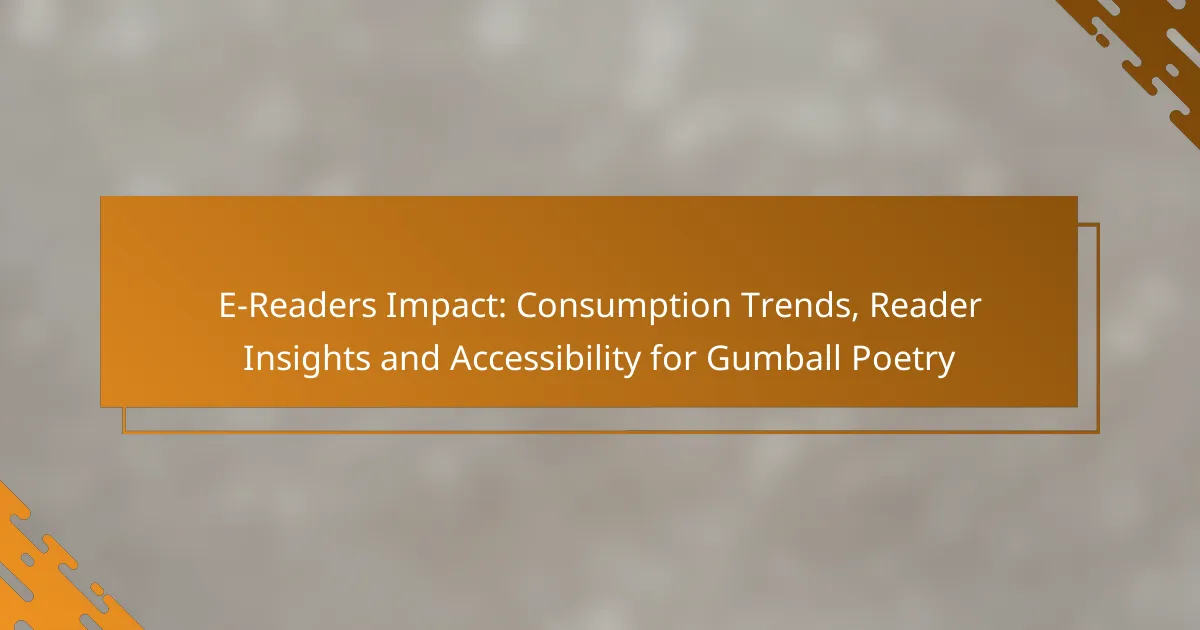For Gumball poetry lovers, the ideal poetry apps blend intuitive design with features that foster creativity and community interaction. These applications empower users to write, share, and explore poetry while connecting with fellow enthusiasts. When choosing a poetry app, focus on those that enhance your writing experience through user-friendly interfaces, customization options, and offline accessibility.
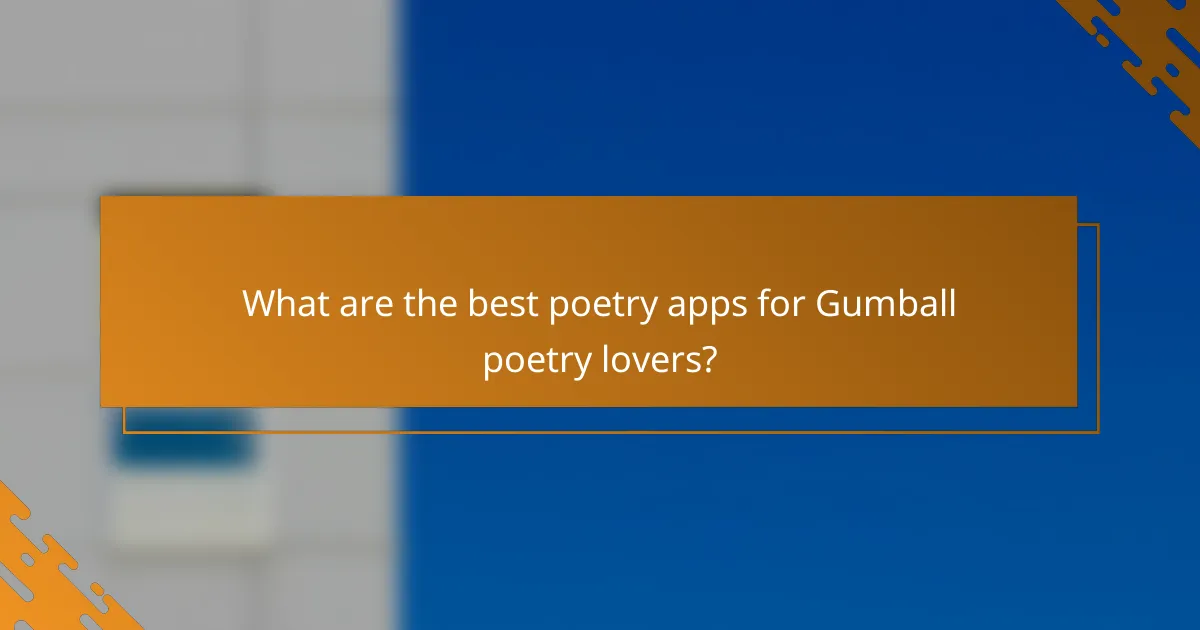
What are the best poetry apps for Gumball poetry lovers?
The best poetry apps for Gumball poetry lovers combine user-friendly interfaces with features that enhance creativity and community engagement. These apps allow users to write, share, and discover poetry while connecting with like-minded individuals.
Gumball Poetry App
The Gumball Poetry App is specifically designed for poetry enthusiasts who enjoy a vibrant community atmosphere. It offers features like daily prompts, collaborative writing options, and a platform for sharing your work with others.
Users can participate in challenges and contests, which can help motivate them to write more frequently. The app’s social features allow for feedback and interaction, making it a great choice for those looking to connect with fellow poets.
Poetizer
Poetizer is a social network tailored for poets, where users can publish their work and engage with a community of writers. The app features a clean interface that makes it easy to navigate and discover new poetry.
One of its standout features is the ability to follow other poets, comment on their work, and receive feedback on your own. This interactive element fosters a supportive environment for Gumball poetry lovers to grow and refine their craft.
Wattpad
Wattpad is a versatile platform that caters to various genres, including poetry. It allows users to publish their poetry alongside stories, reaching a broader audience. The app’s extensive library makes it easy to find inspiration from established and emerging poets.
Writers can engage with readers through comments and votes, which can help gauge the popularity of their work. However, the sheer volume of content can make it challenging for new poets to stand out, so consistent engagement is key.
Verse
Verse is a minimalist poetry app that focuses on the writing experience. It provides a distraction-free environment, allowing users to concentrate on crafting their poems without unnecessary features. The app supports various writing styles and formats, making it suitable for all types of poetry.
Additionally, Verse offers a simple sharing option, enabling users to publish their work on social media or send it to friends. This straightforward approach is ideal for Gumball poetry lovers who prioritize the writing process itself.
RhymeZone
RhymeZone is a valuable tool for poets looking to enhance their writing with rhymes and synonyms. It provides an extensive database of words, making it easy to find the perfect rhyme or alternative phrasing to elevate poetry.
While not a traditional poetry app, its features are essential for poets who want to refine their work. Gumball poetry lovers can use RhymeZone to brainstorm ideas and improve their writing skills, ensuring their poems resonate with readers.
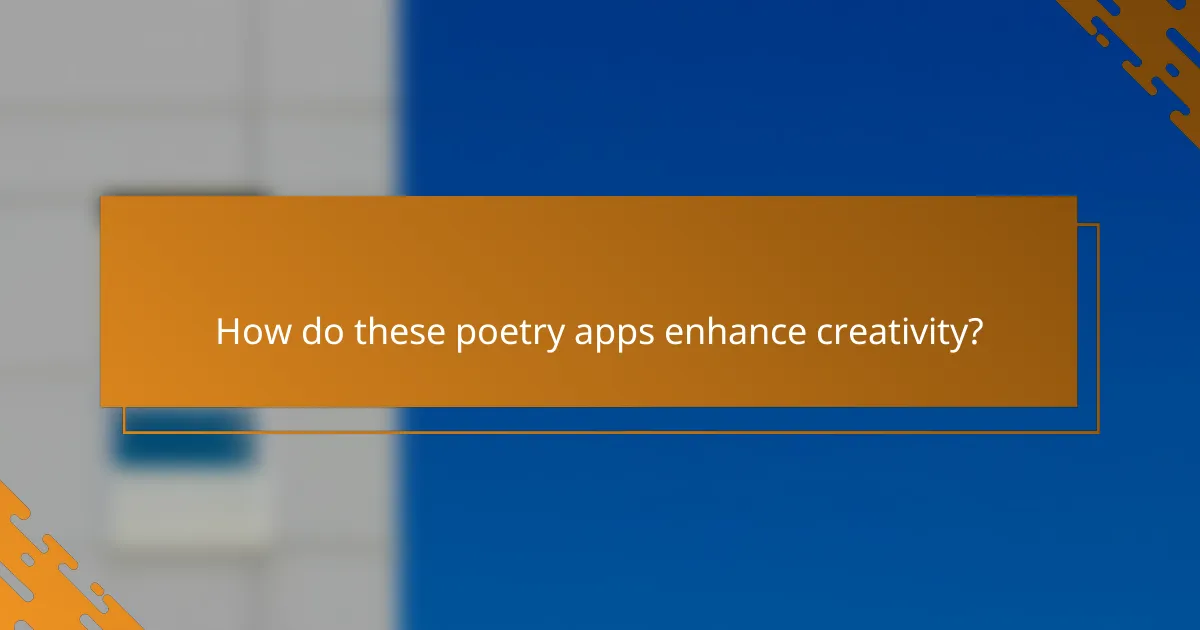
How do these poetry apps enhance creativity?
Poetry apps enhance creativity by providing tools and resources that inspire writers and streamline the creative process. They offer features like writing prompts, community engagement, and collaborative opportunities that stimulate original thought and expression.
Writing prompts and challenges
Writing prompts and challenges are essential features in poetry apps that encourage users to explore new themes and styles. These prompts can range from specific topics, such as nature or love, to more abstract concepts like emotions or colors. Many apps offer daily or weekly challenges that motivate users to write consistently.
For example, an app might present a prompt asking users to write a poem based on a random word generated by the app. This can push writers out of their comfort zones and inspire fresh ideas. Users should consider setting personal goals to complete a certain number of prompts each month to enhance their creativity.
Community feedback and collaboration
Community feedback and collaboration features allow poets to share their work and receive constructive criticism from peers. Many poetry apps include forums or groups where users can post their poems and engage in discussions, fostering a supportive environment for growth. This interaction can lead to improved writing skills and increased motivation.
Additionally, collaborative writing projects enable users to co-create poems, blending different styles and perspectives. When participating in these collaborations, it’s beneficial to communicate openly and respect each other’s creative input. Engaging with a community not only enhances individual creativity but also builds lasting connections among poetry lovers.
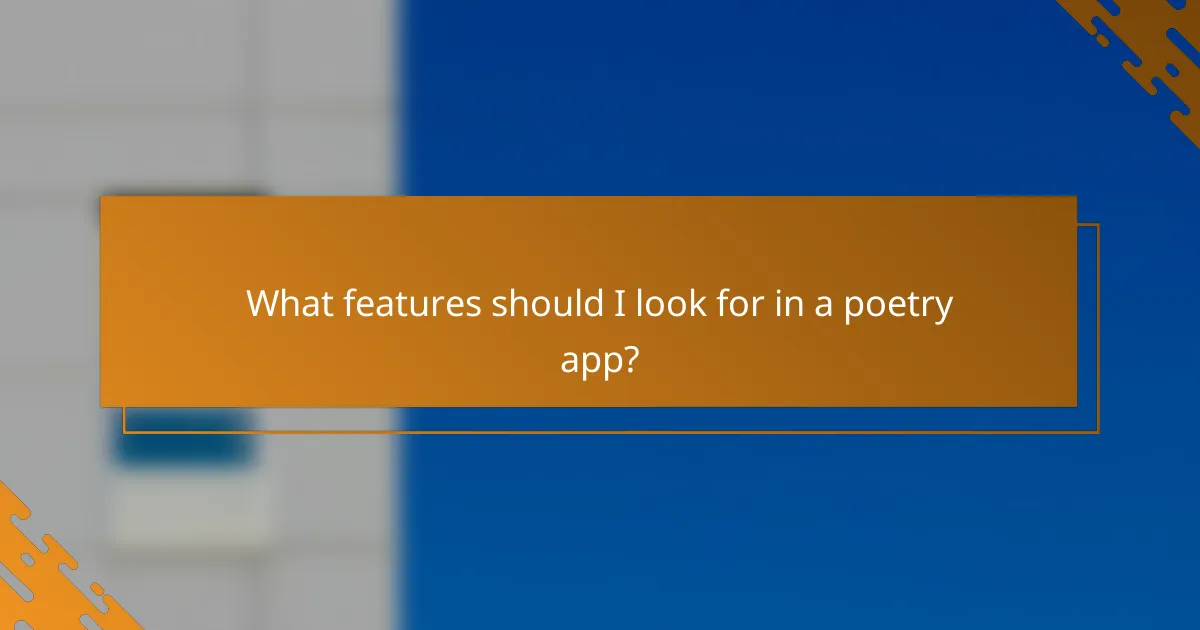
What features should I look for in a poetry app?
When selecting a poetry app, prioritize features that enhance your writing and reading experience. Look for user-friendly interfaces, customization options, and offline access to ensure you can create and enjoy poetry anytime, anywhere.
User-friendly interface
A user-friendly interface is crucial for a smooth experience in any poetry app. It should allow easy navigation, enabling you to find tools and features without frustration. Look for apps that offer intuitive layouts and clear icons, making it simple to focus on your poetry.
Consider apps that provide a distraction-free writing environment. Features like dark mode and adjustable text sizes can significantly enhance usability, especially during long writing sessions.
Customization options
Customization options allow you to tailor the app to your personal writing style. Look for features that let you adjust fonts, colors, and layouts to create a comfortable writing space. Some apps even allow you to save your preferred settings for future use.
Additionally, consider apps that offer templates or prompts to inspire your creativity. These can help you explore different styles or themes, making your poetry writing more dynamic and engaging.
Offline access
Offline access is an essential feature for poets who want to write without interruptions. Ensure the app allows you to download your work and access it without an internet connection. This is particularly useful for writing in locations with limited connectivity.
Check if the app syncs your work automatically when you reconnect to the internet. This feature ensures that your poems are always backed up and accessible across devices, providing peace of mind as you create.
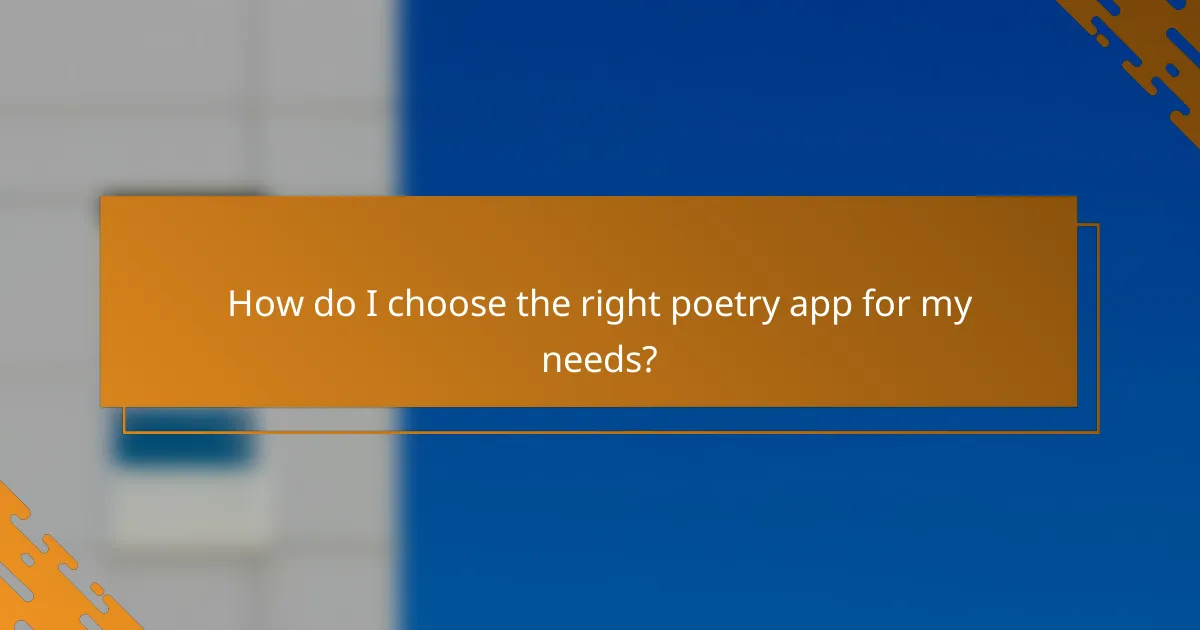
How do I choose the right poetry app for my needs?
Choosing the right poetry app involves understanding your personal writing goals and comparing the functionalities of available options. Consider what features are essential for your creative process, such as writing tools, community engagement, and publishing capabilities.
Assessing personal writing goals
Start by identifying what you want to achieve with your poetry. Are you looking to write and edit your work, share it with others, or find inspiration? Defining these goals will help narrow down your choices.
For example, if you aim to publish your poetry, look for apps that offer submission features or connections to literary magazines. If your focus is on improving your craft, consider apps that provide writing prompts or feedback from a community of poets.
Comparing app functionalities
When comparing poetry apps, evaluate key functionalities such as text editing tools, formatting options, and user interface. Some apps may offer rich text formatting, while others focus on simplicity and ease of use.
Additionally, consider whether the app includes features like collaboration tools, social sharing options, or access to a library of poetry resources. Create a checklist of must-have features to streamline your decision-making process.
Lastly, read user reviews and explore trial versions when available. This hands-on experience can provide insight into the app’s usability and whether it aligns with your writing style.
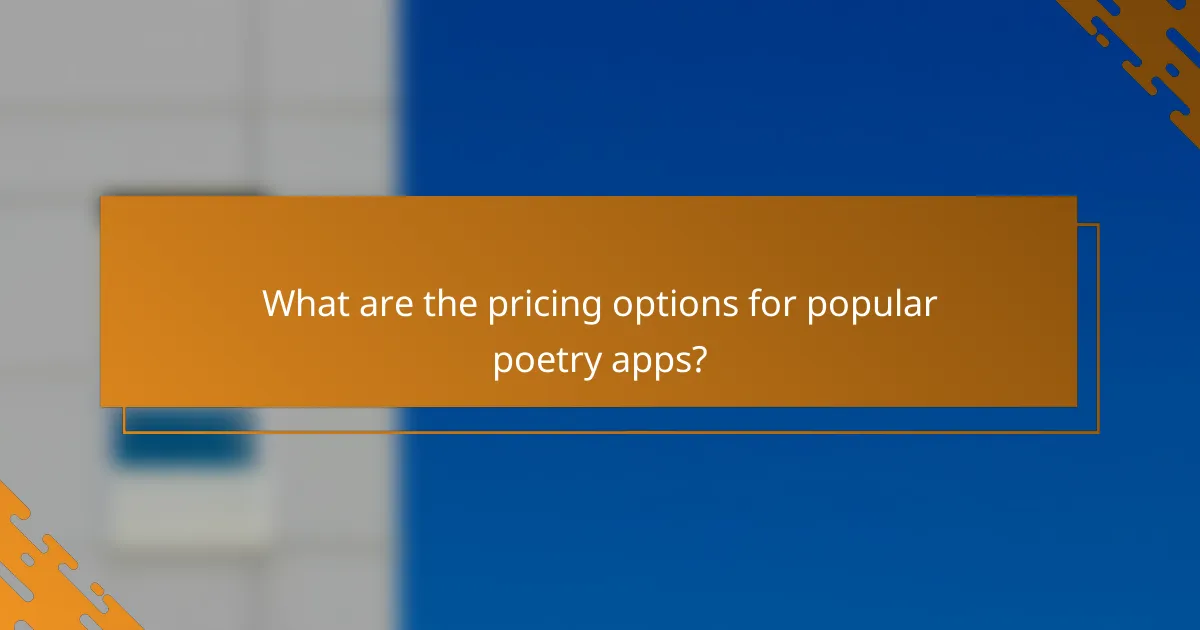
What are the pricing options for popular poetry apps?
Popular poetry apps typically offer a range of pricing options, including free versions with limited features and premium subscriptions that unlock additional functionalities. Users can choose based on their needs, whether they prefer basic access or a more comprehensive experience.
Free vs. premium features
Free versions of poetry apps often include basic functionalities such as poem reading, writing tools, and community sharing. However, premium features may offer advanced editing tools, personalized feedback, and exclusive content, enhancing the creative process.
For instance, while a free app might allow users to save a limited number of poems, a premium subscription could enable unlimited storage, access to writing prompts, and collaboration with other poets. Users should evaluate whether these additional features justify the cost based on their poetry engagement level.
Subscription models
Many poetry apps operate on subscription models, typically charging monthly or annually. Monthly subscriptions can range from around $5 to $15, while annual plans may offer discounts, bringing the cost down to approximately $50 to $100 per year.
When considering a subscription, users should look for trial periods that allow them to test premium features before committing. Additionally, some apps may offer tiered pricing based on the features included, so it’s wise to compare options to find the best fit for individual needs and budget.
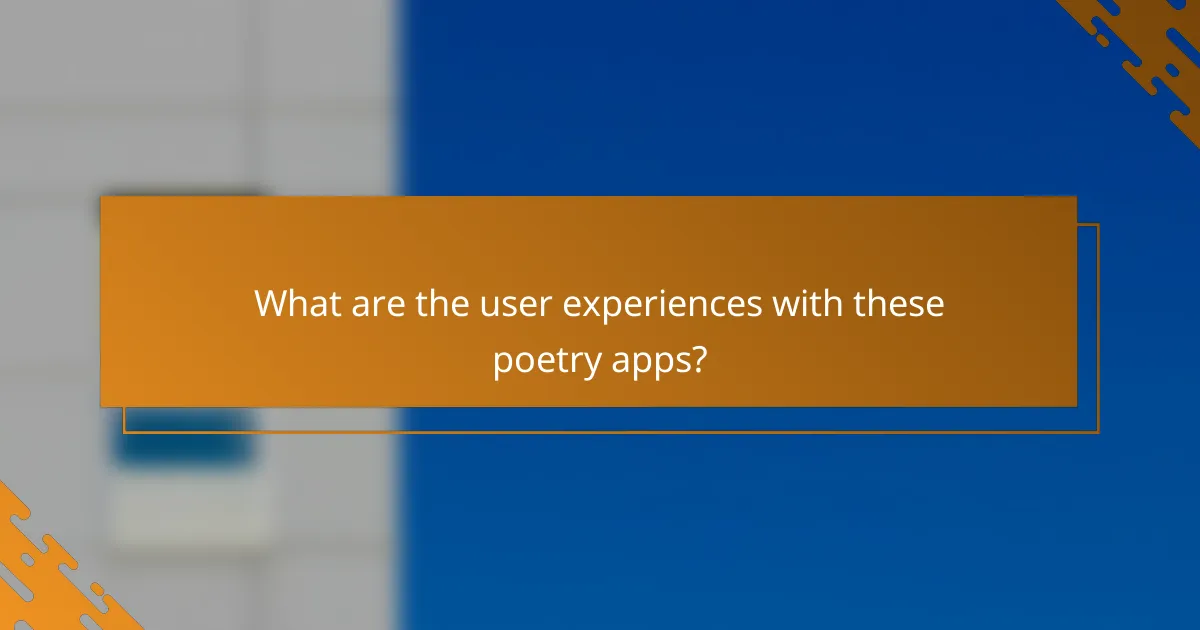
What are the user experiences with these poetry apps?
User experiences with poetry apps vary widely, but many users appreciate features that enhance creativity and accessibility. Key aspects include ease of use, available tools for writing and sharing, and community engagement opportunities.
User reviews and ratings
User reviews for poetry apps often highlight their intuitive interfaces and helpful features. Many users rate apps highly for their ability to facilitate inspiration and streamline the writing process. On platforms like the App Store and Google Play, ratings typically range from 4 to 5 stars, indicating overall satisfaction.
Common feedback includes appreciation for features such as rhyme dictionaries, writing prompts, and community sharing options. However, some users express frustration with ads or limited free features, which can detract from the overall experience.
When choosing a poetry app, consider checking user ratings and reviews to gauge the quality and functionality. Look for apps that have a strong community presence, as this can enhance your creative journey through feedback and collaboration.
